Learning few things about Portugal before your trip will give you greater appreciation for its history, food, culture, language and people. It will make you enjoy sounds and sites of Portugal. Most importantly, it will be a breeze to connect easily with locals and make new friends. So pour yourself glass of wine, put on some Fado music and read on.
History of Portugal.
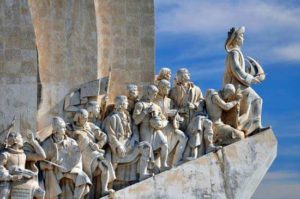 Portugal is one of the oldest nation states in Europe. Its foundation in 1139, predates that of its Iberian neighbor, Spain by nearly 350 years. Romans, who arrived in 218 BC, call the whole peninsula Hispania, but the region between rivers Douro and Tagus was named Lusitania. When Roman Empire collapsed in the 5th century, Hispania was overrun first by Germanic tribes, Visigoths, then by Moors from North Africa in 711 AD. Military request by the Christian kingdoms of the north began in earnest in the 11th century.It was during this long process that Portucale, a small county of kingdom of Leon and Castile, was declared Independent by its first king Afonso Henriques.
Portugal is one of the oldest nation states in Europe. Its foundation in 1139, predates that of its Iberian neighbor, Spain by nearly 350 years. Romans, who arrived in 218 BC, call the whole peninsula Hispania, but the region between rivers Douro and Tagus was named Lusitania. When Roman Empire collapsed in the 5th century, Hispania was overrun first by Germanic tribes, Visigoths, then by Moors from North Africa in 711 AD. Military request by the Christian kingdoms of the north began in earnest in the 11th century.It was during this long process that Portucale, a small county of kingdom of Leon and Castile, was declared Independent by its first king Afonso Henriques.
New kingdom of Portugal expanded southwards to Algarve and adventurous Portuguese sailors began to explore African Coast and the Atlantic Ocean. Portugal’s Golden Age reached its zenith during the reign of Manuel I, with Vasco da Gama voyage to India in 1498 and discovery of Brazil two years later. Eastern trade brought incredible wealth to the Portuguese coffers, but military defeat in Morocco meant that Portugal’s prosperity was short-lived. Spain invaded in 1580 and Spanish kings ruled Portugal for the next 60 years.
Independence
After Portugal regained its independence, her fortunes were restored by discovery of gold in Brazil. In second half of 18th century, chief minister, Marquis the Pombal began to modernize the country and to limit the reactionary influence of the Church. However Napoleon’s invasion in 1807 and the loss of Brazil in 1825 left Portugal impoverished and divided. Despite period of relative stability from 1850s, debt crisis worsened. In 1910, a Republican Revolution overthrew the monarchy.
The economy continued to deteriorate until a military coup in 1926 led to the long dictatorships of Antonio Salazar, Portugal’s version of Franco, who held power from 1928 to 1968. Although Salazar died in July of 1970, weak authoritarian regime he had established continued until Carnation Revolution of 1974. Democracy was restored in 1976. Portugal’s economy was gradually revived by the influx of funds after joining the EU in 1986. Portugal’s Great Recession was far worse than one suffered in US, with credit market and overextended loans. Today’s Portugal emerged strong from the crisis, with tourists discovering her treasures.
Language
Although English is more widely spoken in Portugal than neighboring Spain, Portuguese appreciates visitors efforts, however small, to communicate in their language. Written Portuguese is fairly similar to Spanish, so if you know Spanish you should have little difficulty understanding Portuguese text. However, spoken Portuguese sounds nothing like Spanish. Portuguese are proud of their language, which is widely spoken throughout the world as a result of former colonial ties with Brazil and number of countries in Africa. They may take offense in being a dress in Spanish. Learning few phrases will go a long way in making friends and getting great service. Whenever I travel to new foreign place, I try to take at least 2 hours and learn at least 10 to 20 common phrases. YouTube.com is a great source for free quick lessons. For more ambitious traveler, who tries to defy tourist stereotype of only speaking English, great resource is Pimsleur www.pimsleur.com .
When to go
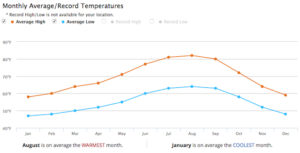 The country’s long Atlantic Coast is the single most important factor in Portugal’s climate. Coastal regions can be very rainy in Winter, and even thought outdoor temperatures don’t drop that low, it often feels very cold. There is a lot of wind coming from the Atlantic. Southern Portugal is the only year-round destination, with hot summers and mild Winters. Madera and other Azure Islands have more temperate climate, but are successful to Winter storms and hurricanes. Best time to visit is Spring and Autumn, because the weather is mild, but Spring, in particular May, can be wet so bring an umbrella. Summers tend to be hot, especially in South countryside away from Atlantic coast, and with Portugal becoming more and more popular with tourist, it can get very crowded.
The country’s long Atlantic Coast is the single most important factor in Portugal’s climate. Coastal regions can be very rainy in Winter, and even thought outdoor temperatures don’t drop that low, it often feels very cold. There is a lot of wind coming from the Atlantic. Southern Portugal is the only year-round destination, with hot summers and mild Winters. Madera and other Azure Islands have more temperate climate, but are successful to Winter storms and hurricanes. Best time to visit is Spring and Autumn, because the weather is mild, but Spring, in particular May, can be wet so bring an umbrella. Summers tend to be hot, especially in South countryside away from Atlantic coast, and with Portugal becoming more and more popular with tourist, it can get very crowded.
Safety and transportation
I found Portugal to be a very friendly and safe place. Most of the crime that tourist encounter is a petty theft, so please watch your purse and wallet, and use common sense. Some drugs are legal in Portugal, so be careful in a shady areas, you might get approached by people trying to sell you drugs. Although this is widely reported on many travel websites I never encountered this throughout my travels in Portugal. Portugal is very family friendly country. Euro is the currency that is used, and in all many major cities and tourist attractions there are ATM machines widely available. Credit cards are widely accepted at tourist attractions and restaurants (Visa and MasterCard, less so American Express).
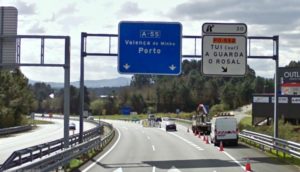
Taxis are inexpensive and Uber is popular with locals and tourists as well, especially in high season or outside of city center. Train system is very good with fast train running multiple times a day between Lisbon and Porto. Driving in a cities can be challenging as medieval architecture and narrow streets make Portuguese towns difficult to navigate, and local drivers can be overly emotional. Highways on the other hand are very good.
Food
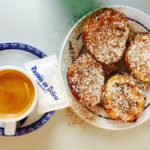 Portugal’s restaurants and bars are lively, inexpensive and a lot of fun. Portuguese cuisine is a balance between centuries old traditional and modern international influence. Seafood dominates coastal menus, but there are delicious meat dishes available as well. When in Porto you must try Francesinha sandwich. This local treat is far from low in calories, made out of Portuguese bread fresh sausage bake a roast meat with melted cheese and sauce made from tomato and beer. Rice, octopus and artisan cheeses make great appetizers. Wine culture is big in Portugal and there is a huge variety of great red, white and country’s specialty: Port wine. Beer is generally on the lite site, its role mostly to quench summer thirst. Microbreweries are popping up, so if you’re into it, explore. I would stick with wine, which is a great bargain and tastes great, especially rich red varietals from Douro Valley.
Portugal’s restaurants and bars are lively, inexpensive and a lot of fun. Portuguese cuisine is a balance between centuries old traditional and modern international influence. Seafood dominates coastal menus, but there are delicious meat dishes available as well. When in Porto you must try Francesinha sandwich. This local treat is far from low in calories, made out of Portuguese bread fresh sausage bake a roast meat with melted cheese and sauce made from tomato and beer. Rice, octopus and artisan cheeses make great appetizers. Wine culture is big in Portugal and there is a huge variety of great red, white and country’s specialty: Port wine. Beer is generally on the lite site, its role mostly to quench summer thirst. Microbreweries are popping up, so if you’re into it, explore. I would stick with wine, which is a great bargain and tastes great, especially rich red varietals from Douro Valley.
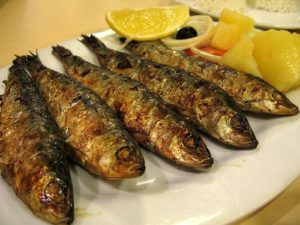
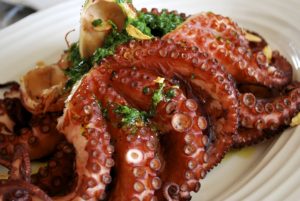
Portugal-octopus
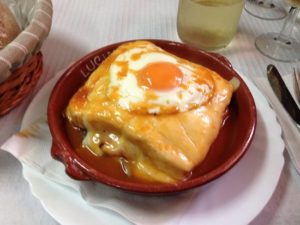
Portugal-francesinha
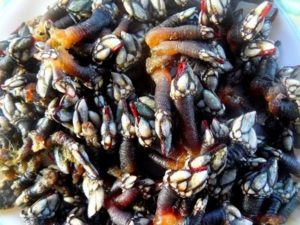
Portugal-Barnacles
Many websites and food shows rave about Portuguese cuisine. I found it simple, with fresh ingredients from the sea and farm, and especially friendly locals making all the difference. Make sure you walk a lot to burn all the calories you will eat and drink.
Don’t forget that in Portugal dinner is served very late, with many local restaurants not opening until 7:30 PM. This is not a problem in tourist areas and hotels, but check with restaurant when heading out to eat.
Fado, sound of Portugal
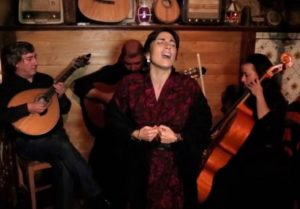
Fado singer
Fado music is to Portugal, what Flamenco is to Spain. It defines Portuguese spirit. Like blues, Fado is an expression of longing and sorrow. It literally means “fate”, it owes much of the concept to longing for what has been lost and for what never has been attained, which accounts for its emotional power. People of Lisbon have nurtured this poignant music in backstreet cafes and restaurants for over 150 years. It is sung by both women and men, always accompanied by guitar and viola. Even though it is native to Lisbon, its popularity with tourists allows one to encounter it in many parts of Portugal.

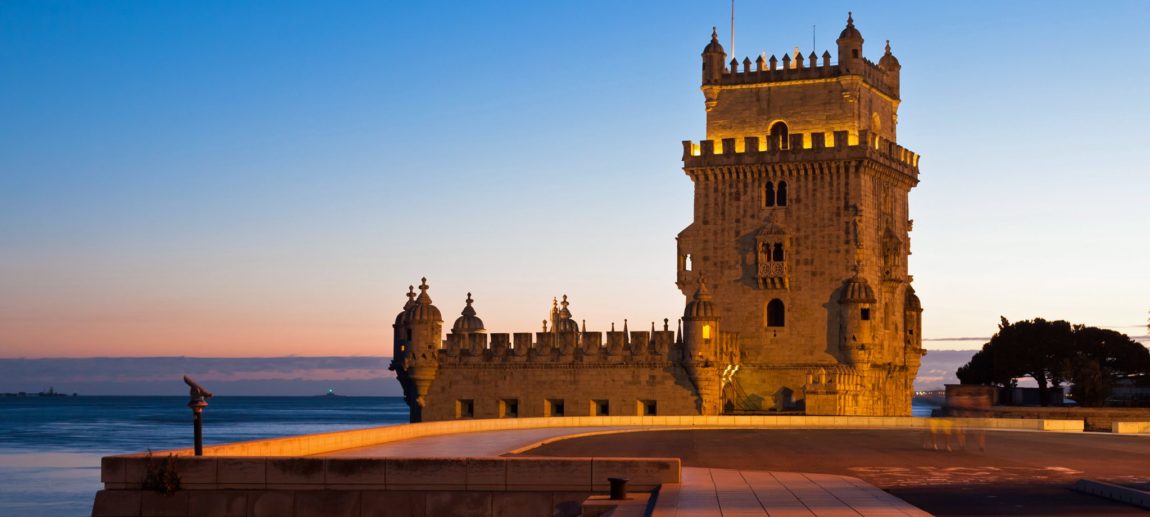

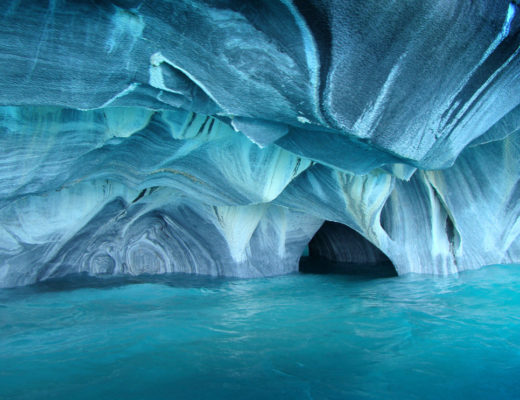
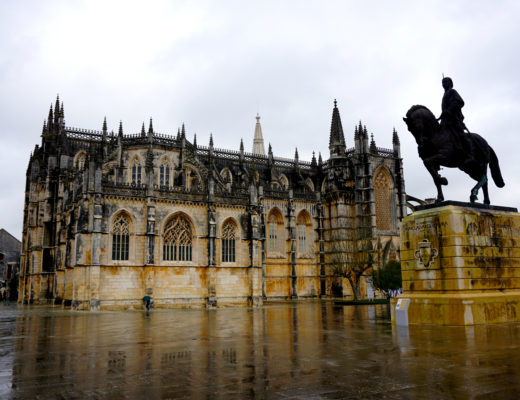
SPAIN: History, Food, Culture and Language - PointsTravels
July 12, 2018 at 7:29 pm[…] after touring Portugal it was time for our adventure in Spain to begin and for us to explore great cities of Salamanca, […]